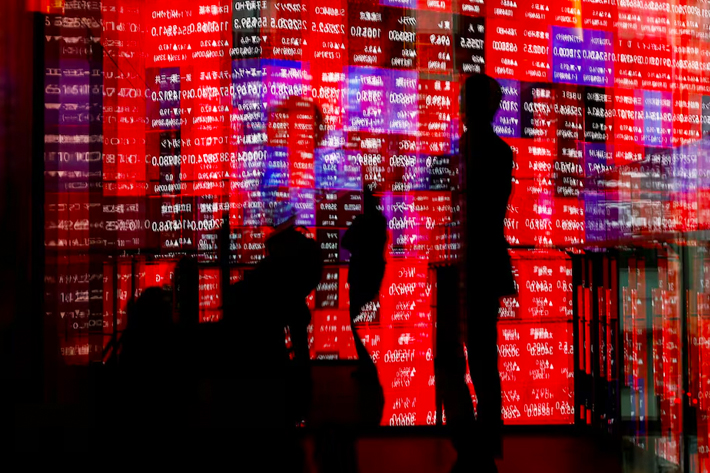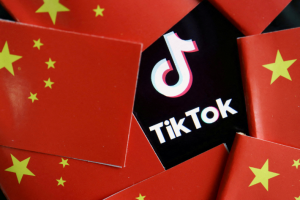Asia’s major markets went off in different directions on Wednesday as rising Middle East tensions sent many investors towards less-risky markets while others were still riding the wave of Beijing’s stimulus ‘bazooka’ last week.
Most of the region’s markets sank though, catching up with the sell-off on Wall Street after Iran’s ballistic missile strike on Israel provoked fears of a wider regional conflict, while crude oil pushed higher on the risk of supply disruptions.
Investors flocked to safer assets, keeping US Treasury yields depressed in Asian time, while gold traded not far from an all-time high. The safe-haven dollar traded close to its strongest in three weeks versus the euro.
Also on AF: Continued Fossil Fuel Investments Put $557 Trillion ‘At Risk’
Japan’s Nikkei share average ended lower, as the Middle East missile attacks left investors with little appetite for riskier assets.
The Nikkei extended losses to slide 2.18% to an over one-week closing low of 37,808.76, while the broader Topix finished 1.44% lower at 2,651.96.
Japanese technology shares led the losses, following their US peers lower after a nearly 3% drop on the Philadelphia SE Semiconductor index overnight.
Chip-related shares Tokyo Electron and Advantest slipped 3.7% and 4.8%, respectively, while AI-focused startup investor SoftBank Group 9984.T fell 2.4%.
Bucking the trend, energy shares were supported by a jump in oil prices on fears that the Middle East conflict could disrupt supply.
In sharp contrast, shares jumped more than 6% in Hong Kong to cross the 22,000 mark for the first time since February last year, as a China stimulus-fuelled rally resumed following a one-day holiday.
The Hang Seng Index soared 6.20%, or 1,310.05 points, to 22,443.73.
China Property Soars
Traders have been rushing to snap up stocks after Beijing last week rolled out a raft of measures aimed at reviving the China’s struggling economy, particularly its ailing real estate sector.
Developers were again the big winners in Wednesday’s surge, with Sunac China Holdings up a whopping 75% and Kaisa Group up around 48%.
Tech firms were also well bought, with e-commerce giant JD.com rallying nearly 11%, Meituan putting on more than 14%, and market heavyweight Alibaba nearly 5%. Markets in Shanghai and Shenzhen were closed for a week-long holiday.
Elsewhere across the region, South Korea’s Kospi dropped 1.22% but trading in Taiwan was suspended due to a typhoon. MSCI’s broadest index of Asia-Pacific shares was, though, lifted 0.6%, despite broadly fragile investor sentiment.
US S&P 500 stock index futures weakened 0.15%, after the cash index lost 0.9% overnight. But pan-European STOXX 50 futures pointed up 0.4%.
Iran said early on Wednesday that its missile attack on Israel was finished barring further provocation, although Israel and the US promised retaliation.
Brent crude futures gained 1.5% to $74.66 per barrel, extending the 2.5% advance from Tuesday. US WTI futures climbed 1.7% to $71 per barrel, after Tuesday’s 2.4% rally.
Fed Rates Pushback
Gold eased 0.3% to $2,654.27 per ounce, following a more than 1% jump in the previous session that brought it close to last month’s record high at $2,685.42.
Benchmark 10-year Treasury yields ticked down about 1 basis point (bp) to 3.7353%.
The dollar index, which tracks the US currency versus the euro and five other major rivals, was steady at 101.27 after pushing as high as 101.39 on Tuesday for the first time since September 19.
Meanwhile, US figures overnight showed a solid economy, a day after Fed Chair Jerome Powell pushed back against the likelihood of another 50 basis point rate cut when the US central bank meets next month.
Job openings unexpectedly increased in August after two straight monthly decreases, but hiring was soft and consistent with a slowing labour market.
Private payrolls data is due later on Wednesday, ahead of potentially crucial monthly non-farm payrolls numbers on Friday.
A crippling US dock strike, that could cost the economy $5 billion each day, will also be front of investor minds, with hopes for a quick end dashed by a lack of active negotiation overnight.
Key figures
Tokyo – Nikkei 225 < DOWN 2.18% at 37,808.76 (close)
Hong Kong – Hang Seng Index > UP 6.20% at 22,443.73 (close)
Shanghai – Composite <> CLOSED
London – FTSE 100 > UP 0.50% at 8,317.84 (0939 BST)
New York – Dow < DOWN 0.41% at 42,156.97 (Tuesday close)
- Reuters with additional editing by Sean O’Meara
Read more:
China’s Bid to Lift Household Consumption ‘Will Take Years’
Ishiba Confirmed as PM, Ahead of October 27 Snap Election
Chinese Banks Will be Told to Cut Mortgages by End-Oct: PBOC
Nikkei Sinks, But China Stocks See Their Biggest Day Since 2008
























